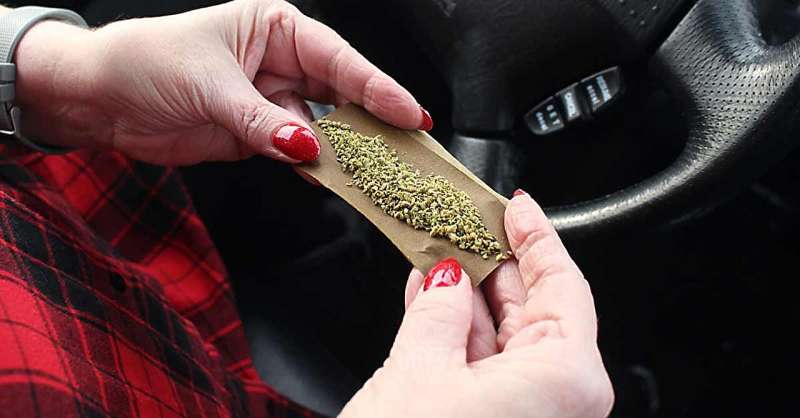This article has been reviewed according to Science X's editorial process and policies. Editors have highlighted the following attributes while ensuring the content's credibility:
fact-checked
peer-reviewed publication
trusted source
proofread
Can field sobriety tests identify drivers under the influence of cannabis?

Road safety is a critical issue in an era of increasing cannabis legalization. Cannabis is known to impair reaction time, decision-making, coordination and perception—skills necessary for safe driving. In the last three years, California has seen a 62% increase in the number of fatal crashes involving drug-related impairment.
Unlike the association of blood alcohol concentrations with impairment, tetrahydrocannabinol (THC) blood concentrations do not correlate with driving performance. Law enforcement officers instead rely on behavioral tests to determine a driver's level of impairment. However, these field sobriety tests were primarily validated based on alcohol ingestion, so how useful they are in detecting cannabis impairment remains unclear.
In a study published August 2, 2023 in JAMA Psychiatry, researchers at the University of California San Diego Center for Medicinal Cannabis Research performed a double-blind, placebo-controlled randomized clinical trial to evaluate how accurate field sobriety tests are in identifying drivers under the influence of THC.
The results showed that tests administered by law enforcement officers could differentiate between individuals who had consumed THC versus those who had not at certain time points. Still, the overall accuracy of the tests may be insufficient to denote THC impairment on their own.
"Driving is a complex task that requires intact attention and motor skills to stay safe," said first author Thomas Marcotte, Ph.D., professor of psychiatry at UC San Diego School of Medicine and co-director of the Center for Medicinal Cannabis Research at UC San Diego. "While cannabis can be impairing, the effects vary for each individual. There is thus a public health need to confirm that evaluations of impairment are effective and unbiased, and this study is an important step towards that goal."
The study included 184 adult cannabis users between the ages of 21 and 55. During the experiment, 63 participants received a placebo cannabis cigarette while 121 participants received a THC cannabis cigarette. Participants who consumed the THC reported a median highness level of 64 on a scale of 0 to 100, suggesting the content was sufficient to achieve significant intoxication.
Highly trained law enforcement officers then performed field sobriety tests to examine abilities such as balance, coordination, divided attention and eye movements. These include the Walk and Turn, One Leg Stand, Finger to Nose, Lack of Convergence and Modified Romberg tests. The tests were performed at four different time intervals, roughly one, two, three and four hours after smoking.
The results showed that officers classified a significantly higher proportion of participants in the THC group as being impaired based on the field sobriety tests compared to the placebo group at three of the four time points measured. For example, one hour after smoking, they labeled 98 participants (81%) from the THC group as being impaired based on their performance, and 31 participants (49%) from the placebo group.
But regardless of their actual assignment (THC vs. placebo), officers suspected that 99% of those who failed the tests had received THC.
Study participants also completed a driving simulation, and their performance was significantly associated with the results of select field sobriety tests, though officers were not privy to this information.
The researchers concluded that existing field sobriety tests may be sensitive enough to detect those under the influence of cannabis. However, the substantial overlap in poor test performance between the placebo and THC groups, and the high frequency at which officers suspected this was because of THC consumption, suggest that field sobriety tests alone may be insufficient to identify THC-specific driving impairment.
The authors note that officers in the field would be equipped with more information by interviewing the driver and observing their driving ability, so pairing the field sobriety tests with this additional information could prove more successful in an overall determination of whether a driver is impaired.
"Field sobriety tests are useful additions to overall evaluations of drivers, but are not accurate enough on their own to determine THC impairment," said Marcotte. "New effective measures for identifying cannabis impairment are needed to ensure the safety of all drivers on the road."
More information: Thomas D. Marcotte et al, Evaluation of Field Sobriety Tests for Identifying Drivers Under the Influence of Cannabis, JAMA Psychiatry (2023). DOI: 10.1001/jamapsychiatry.2023.2345




















